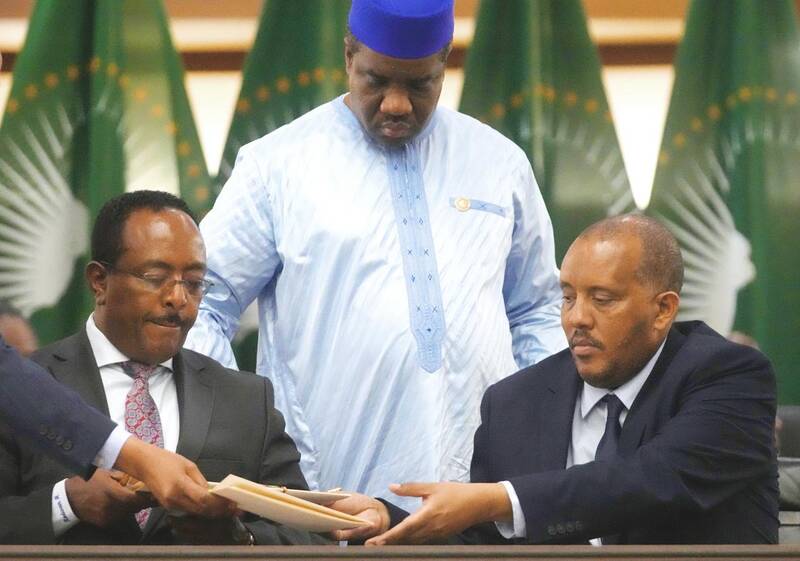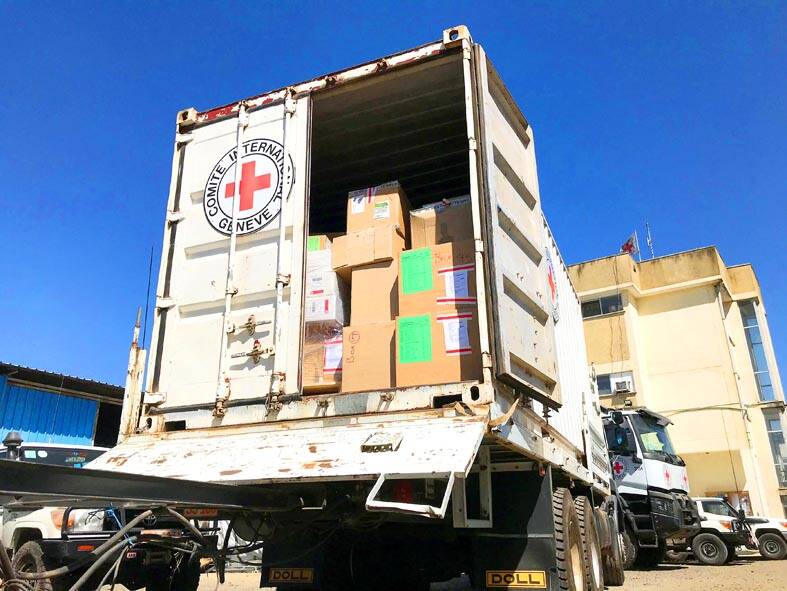The warring sides in Ethiopia’s civil war on Wednesday announced an agreement to silence their guns after two years of devastating conflict that have claimed thousands of lives and left millions needing aid in Africa’s second-most populous country.
The surprise deal between the administration of Ethiopian Prime Minister Abiy Ahmed and Tigrayan rebels was unveiled after more than a week of negotiations led by the African Union in South Africa. It was hailed by the UN and the US, among others.
“We have agreed to permanently silence the guns and end the two years of conflict in northern Ethiopia,” the Ethiopian government and the Tigray People’s Liberation Front (TPLF) said in a joint statement after marathon talks.

Photo: AP
The breakthrough was announced by the African Union’s mediator, former Nigerian president Olusegun Obasanjo, almost exactly two years to the day since the war erupted in November 2020.
“Today is the beginning of a new dawn for Ethiopia, for the Horn of Africa and indeed for Africa as a whole,” he said.
“The two parties in the Ethiopian conflict have formally agreed to the cessation of hostilities, as well as the systematic, orderly, smooth and coordinated disarmament,” Obasanjo told a briefing in Pretoria.

Photo: REUTERS / International Committee of the Red Cross
They also agreed on a “restoration of law and order, restoration of services, unhindered access to humanitarian supplies, protection of civilians ... among other areas of agreement,” he added.
It was not immediately clear how the deal would be monitored to ensure it was implemented, and there was no mention by Obasanjo of international and TPLF calls for Eritrean forces to withdraw from the battlefield.
Diplomatic efforts to bring Abiy’s government and the TPLF to the negotiating table had taken on renewed urgency after combat resumed in late August, torpedoing a five-month truce that had allowed limited amounts of aid into war-stricken Tigray.
The talks were launched on Tuesday last week and were initially scheduled to run until Sunday, but were extended.
They were the first formal dialogue between the two sides since the start of the conflict, which had raised concerns about the stability of Ethiopia and the volatile Horn of Africa region.
UN Secretary-General Antonio Guterres hailed the announcement as “a welcome first step” that could “bring some solace” to millions of suffering civilians, his spokesman, Stephane Dujarric, told reporters.
The US also described it as an “important step towards peace,” with US Department of State spokesman Ned Price hoping it would lead to a “durable cessation of hostilities to set the stage for an end to human rights abuses and atrocities.”
The delegations in Pretoria said it was now up to the two sides to honor the agreement, while Abiy himself vowed a “strong” commitment to its implementation.
The head of the government’s team, Ethiopian National Security Adviser Redwan Hussein, praised the sides for their “constructive engagement to allow the country to put this tragic period of conflict behind us.”
Tigrayan delegation head Getachew Reda said the TPLF is ready to “implement and expedite this agreement.”
“In order to address the pains of our people, we have made concessions because we have to build trust,” he said.
The war has forced more than 2 million people from their homes, and killed as many as 500,000 people, the US estimates.
Despite the talks in Pretoria, intense fighting continued unabated in Tigray, where government troops backed by the Eritrean army and regional forces waged artillery bombardments and airstrikes, capturing a string of towns from the TPLF.
The international community had voiced increasing alarm over the combat and the toll among civilians caught in the crossfire.
Asked about Eritrea, former South African vice president Phumzile Mlambo-Ngcuka, who was facilitating the negotiations, said: “These two parties [Ethiopia’s government and Tigrayan authorities] are not the only two groups that are relevant for peace to happen in Ethiopia... So we are entrusting them with the responsibility of going back home to socialize this agreement ... to ensure that many more people embrace this agreement.”
Tigray, a region of 6 million people, has been under a communications blackout for much of the conflict, lacking basic services and facing dire shortages of food, fuel and medicines.
The conflict erupted on Nov. 4, 2020, when Abiy, a Nobel peace prize laureate, sent troops into Tigray after accusing the TPLF, the regional ruling party, of attacking Ethiopian army camps.
The fighting followed months of seething tensions between Abiy and the TPLF, which had dominated the ruling coalition in Ethiopia for almost three decades before he came to power in 2018.

Kehinde Sanni spends his days smoothing out dents and repainting scratched bumpers in a modest autobody shop in Lagos. He has never left Nigeria, yet he speaks glowingly of Burkina Faso military leader Ibrahim Traore. “Nigeria needs someone like Ibrahim Traore of Burkina Faso. He is doing well for his country,” Sanni said. His admiration is shaped by a steady stream of viral videos, memes and social media posts — many misleading or outright false — portraying Traore as a fearless reformer who defied Western powers and reclaimed his country’s dignity. The Burkinabe strongman swept into power following a coup in September 2022

‘FRAGMENTING’: British politics have for a long time been dominated by the Labor Party and the Tories, but polls suggest that Reform now poses a significant challenge Hard-right upstarts Reform UK snatched a parliamentary seat from British Prime Minister Keir Starmer’s Labor Party yesterday in local elections that dealt a blow to the UK’s two establishment parties. Reform, led by anti-immigrant firebrand Nigel Farage, won the by-election in Runcorn and Helsby in northwest England by just six votes, as it picked up gains in other localities, including one mayoralty. The group’s strong showing continues momentum it built up at last year’s general election and appears to confirm a trend that the UK is entering an era of multi-party politics. “For the movement, for the party it’s a very, very big

ENTERTAINMENT: Rio officials have a history of organizing massive concerts on Copacabana Beach, with Madonna’s show drawing about 1.6 million fans last year Lady Gaga on Saturday night gave a free concert in front of 2 million fans who poured onto Copacabana Beach in Rio de Janeiro for the biggest show of her career. “Tonight, we’re making history... Thank you for making history with me,” Lady Gaga told a screaming crowd. The Mother Monster, as she is known, started the show at about 10:10pm local time with her 2011 song Bloody Mary. Cries of joy rose from the tightly packed fans who sang and danced shoulder-to-shoulder on the vast stretch of sand. Concert organizers said 2.1 million people attended the show. Lady Gaga

SUPPORT: The Australian prime minister promised to back Kyiv against Russia’s invasion, saying: ‘That’s my government’s position. It was yesterday. It still is’ Left-leaning Australian Prime Minister Anthony Albanese yesterday basked in his landslide election win, promising a “disciplined, orderly” government to confront cost-of-living pain and tariff turmoil. People clapped as the 62-year-old and his fiancee, Jodie Haydon, who visited his old inner Sydney haunt, Cafe Italia, surrounded by a crowd of jostling photographers and journalists. Albanese’s Labor Party is on course to win at least 83 seats in the 150-member parliament, partial results showed. Opposition leader Peter Dutton’s conservative Liberal-National coalition had just 38 seats, and other parties 12. Another 17 seats were still in doubt. “We will be a disciplined, orderly